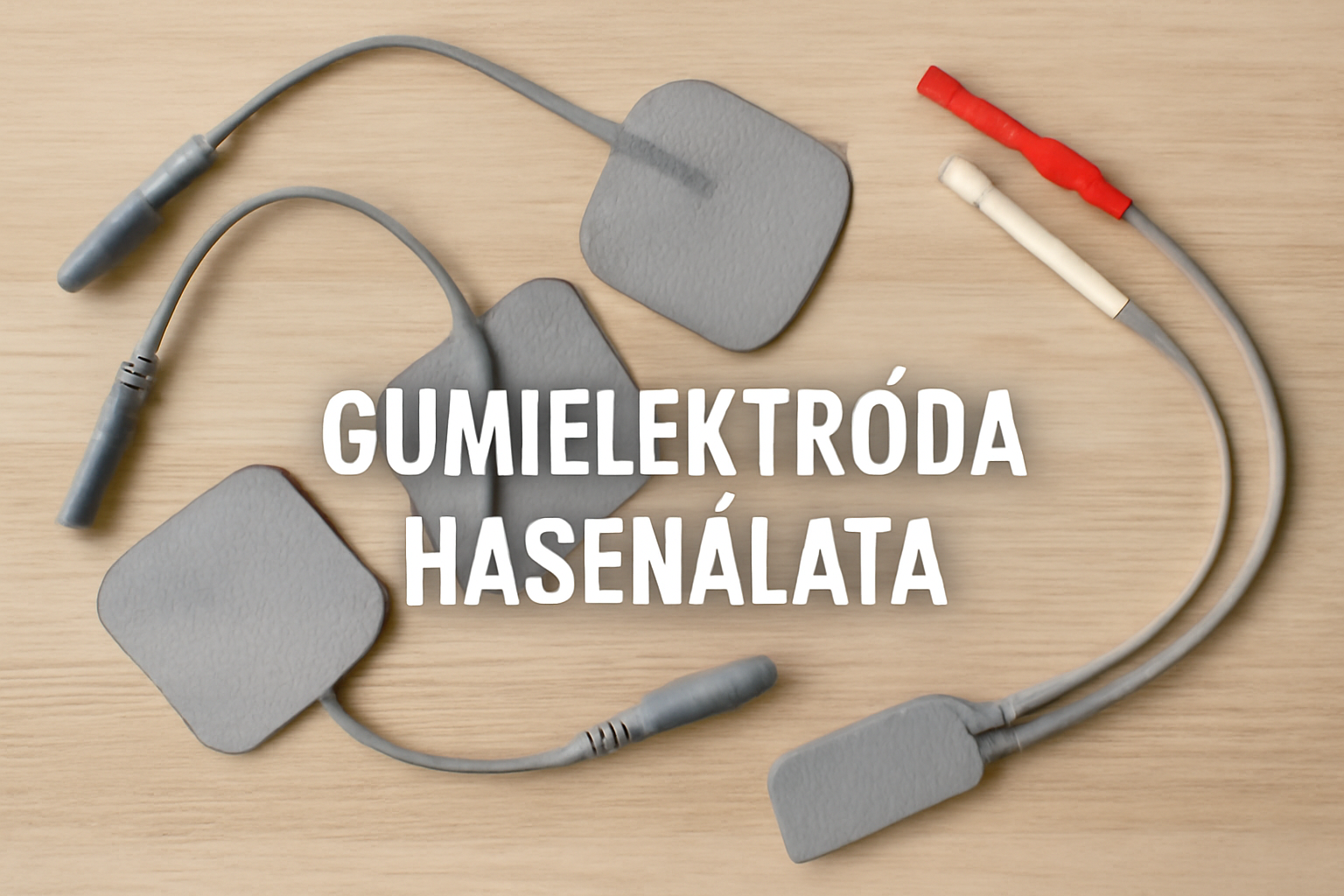The concept of gumielektróda használata (rubber electrode usage) has become increasingly significant in various technical fields due to its flexibility, efficiency, and applicability in multiple sectors. Rubber electrodes, primarily composed of rubber-based materials that allow for electrical conductivity, are used in several industries ranging from medical to industrial and even research environments. The unique properties of rubber, including its elasticity and durability, have made it an invaluable component in devices that require efficient electrical conductivity, comfort, and reliability. This article delves into the benefits, applications, and the broader significance of gumielektróda használata.
What are Rubber Electrodes?
Rubber electrodes are electrical conductors made from rubber materials that have been engineered to maintain flexibility while allowing electrical currents to flow through them. These electrodes can be molded into various shapes and sizes to suit different applications. They are typically used to establish electrical contact with a material, surface, or biological tissue in a way that minimizes physical damage or irritation.
Unlike traditional electrodes made from metals such as copper or steel, rubber electrodes provide flexibility and comfort without compromising their efficiency in conducting electricity. These properties make them highly valuable in environments that demand dynamic or adaptable components, such as wearable electronics, medical devices, and industrial systems.
The Applications of Gumielektróda Használata
Medical Applications
One of the most well-known applications of gumielektróda használata is in the medical field. Rubber electrodes play an essential role in various diagnostic and monitoring devices, such as electrocardiograms (ECGs), electroencephalograms (EEGs), and electromyograms (EMGs). These diagnostic tools monitor electrical activity in the heart, brain, and muscles, respectively, and require electrodes that can comfortably adhere to the skin without causing discomfort.
Rubber electrodes are often preferred in these medical settings due to their flexibility and ease of use. They can conform to the contours of the body, making them suitable for long-term use in both adults and children. The softness of rubber electrodes ensures that patients experience minimal discomfort, even when the electrodes are attached for extended periods, which is common in certain diagnostic tests.
Moreover, rubber electrodes in medical devices are designed to be both conductive and comfortable, helping to establish clear and accurate signals from the body without causing irritation or skin damage. This makes them especially useful in environments where patient comfort and safety are critical.
Industrial Applications
In industrial environments, gumielektróda használata is critical in processes such as electroplating, welding, galvanizing, and chemical production. Rubber electrodes are often used in electrochemical reactions where it is essential to have precise and reliable electrical contact with a substrate, such as during the process of plating metals or coating objects with conductive material.
In these industrial applications, rubber electrodes serve to create controlled electrical conditions that ensure the desired reactions take place. The flexibility and durability of rubber make it an ideal material for electrodes used in high-temperature environments or where there is a need for frequent movement or adjustment of the equipment. Unlike metal electrodes, which can corrode or degrade over time, rubber electrodes are less likely to suffer from damage caused by the harsh conditions present in many industrial processes.
Furthermore, rubber electrodes are used in equipment that requires a non-conductive casing or insulation, providing an added layer of protection in devices like batteries or power converters. Their ability to withstand harsh chemical environments and mechanical stress makes them highly effective in industrial applications where other materials might fail.
Research and Development
The versatility of gumielektróda használata also extends to research settings, particularly in the fields of electrochemistry and materials science. Researchers use rubber electrodes to study a wide range of phenomena, including electrochemical reactions, the effects of electrical currents on materials, and the development of new energy storage technologies such as batteries and supercapacitors.
Rubber electrodes offer a level of flexibility and customization that other types of electrodes may not provide. For example, scientists can modify the shape, size, and material composition of rubber electrodes to suit specific experimental needs. This flexibility allows for the testing of various hypotheses and the exploration of new applications in fields ranging from energy storage to the development of wearable sensors.
In laboratory experiments, gumielektróda használata is crucial for maintaining stable, consistent electrical connections while minimizing interference from environmental factors. Researchers have also discovered that rubber electrodes can be used to create electrodes for highly sensitive electrochemical sensors, improving the accuracy of experimental results in both academic and industrial research.
Consumer Electronics
The rise of wearable technology has further amplified the importance of gumielektróda használata in the consumer electronics industry. Many modern wearable devices, such as fitness trackers, smartwatches, and health-monitoring systems, rely on rubber electrodes to capture vital biometric data like heart rate, body temperature, and even electrodermal activity.
In wearable devices, rubber electrodes offer the ideal balance between comfort and functionality. Unlike traditional electrodes made of rigid materials, rubber electrodes can be molded to the shape of the skin and worn for extended periods without discomfort. The flexibility of rubber also allows these electrodes to be seamlessly integrated into form factors such as wristbands, patches, and other compact devices.
Another advantage of using rubber electrodes in consumer electronics is their ability to maintain a consistent connection with the skin, even during physical activities like running, cycling, or exercising. This makes them highly valuable in applications that require continuous monitoring of physiological parameters, such as heart rate variability or skin conductivity.
The Advantages of Gumielektróda Használata
Flexibility and Comfort
One of the key benefits of gumielektróda használata is the flexibility that rubber electrodes provide. This flexibility allows them to be used in environments where traditional rigid electrodes might not be effective. The ability to conform to different shapes and sizes also makes them comfortable for the user, particularly in medical and consumer electronics applications.
For instance, in wearable health devices, rubber electrodes are designed to ensure a snug fit on the skin, providing accurate readings while maintaining a high level of comfort for the wearer. In medical applications, this flexibility allows for easier attachment to patients’ bodies during diagnostic tests, reducing the chances of discomfort or skin irritation.
Durability
Rubber electrodes are highly durable, which makes them ideal for use in environments where traditional materials may fail due to wear and tear. Rubber can withstand exposure to extreme temperatures, chemicals, and physical stress, making it a reliable choice for industrial, medical, and research applications.
Unlike metal electrodes, which are susceptible to corrosion and degradation over time, rubber electrodes maintain their structural integrity even in harsh conditions. This long-lasting durability ensures that rubber electrodes provide consistent performance over extended periods, making them an excellent investment for industries that rely on high-performance components.
Cost-Effectiveness
Rubber electrodes are generally more cost-effective than their metal counterparts, which makes them an attractive option for industries looking to minimize costs. The affordability of rubber electrodes has also contributed to their widespread use in medical devices, consumer electronics, and industrial processes.
The cost-effectiveness of rubber electrodes does not come at the expense of quality or performance. Rubber electrodes are designed to deliver reliable electrical conductivity and durability, ensuring that they meet the demands of various applications without breaking the budget.
Ease of Use
Another advantage of gumielektróda használata is the ease with which rubber electrodes can be used. They are relatively simple to install, maintain, and replace, which is crucial in industries where quick turnaround times and minimal downtime are important. In medical settings, rubber electrodes can be quickly attached and removed from the patient’s body, making diagnostic procedures more efficient and comfortable for both healthcare providers and patients.
Customization
Rubber electrodes are highly customizable, allowing manufacturers to create electrodes that are tailored to specific applications. Whether in medical devices, industrial equipment, or consumer electronics, the ability to modify the shape, size, and material properties of rubber electrodes allows for a high degree of flexibility in product design.
Researchers, in particular, benefit from this customization, as they can create electrodes that are optimized for particular experimental conditions. This level of adaptability has contributed to the growing importance of gumielektróda használata in cutting-edge research and technological development.
Read also: Exploring the Concept of Tuerzeechizos and Its Modern Relevance
Conclusion
The usage of rubber electrodes, or gumielektróda használata, is a critical aspect of numerous industries and applications. From medical diagnostics to industrial processes and consumer electronics, the flexibility, durability, and cost-effectiveness of rubber electrodes make them an indispensable component in modern technology. As industries continue to evolve and the demand for efficient, comfortable, and customizable solutions grows, the role of rubber electrodes is set to expand, cementing their place as a key element in future innovations.
With their wide range of applications and numerous advantages, rubber electrodes are likely to continue playing an essential role in improving technologies across various sectors. Whether it’s for providing precise medical monitoring or creating flexible, wearable devices, gumielektróda használata is a concept that will remain at the forefront of technological advancements.


